Britain has been swarmed by an exceptionally high number of wasps this year due to a dry spring and the summer heatwave, experts have said.
With last month England’s hottest June on record and the third heatwave of the summer set to peak today with temperatures of 32C, wasp populations have increased in ‘numerous’ numbers.
Seirian Sumner, UCL’s professor of behavioural ecology, told The I Paper that the early summer heat and driest spring conditions in 132 years have resulted in a ‘good wasp year’ for 2025.
Professor Sumner explained that a cold and wet spring means that wasp nests are ‘more likely to fail’, with the high UK temperatures increasing insect populations that wasps then hunt as prey and feed to their brood.
Spring weather always has a big impact on wasp success as it is the most vulnerable time in their life cycle. It’s at this time of year that the wasp queen emerges from hibernation and builds her nest alone.
She then has to forage to feed the brood, and if it’s a cold, wet spring then survival of nests is low.
But this year, Daniel Steward, managing director at Shield Pest Control, insists that his teams have received a ‘noticeable increase in wasp-related enquiries’ across the summer.
He told the publication that the stark rise in temperatures have sped up the wasp breeding cycle, resulting in ‘nests forming sooner and reaching larger sizes by mid-summer’.
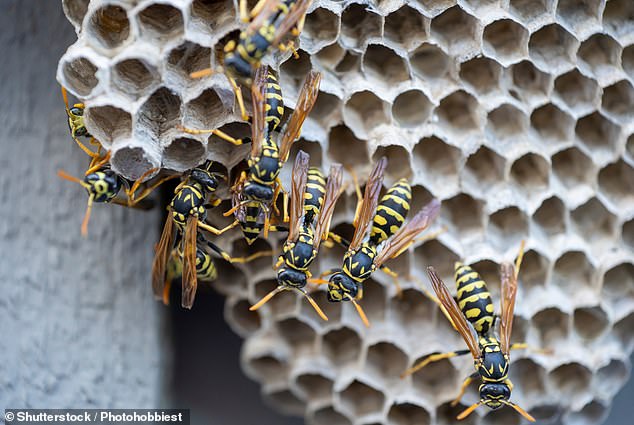
With last month England’s hottest June on record and the third heatwave of the summer set to peak today with temperatures of 32C, wasp populations have increased in ‘numerous’ numbers (file image)
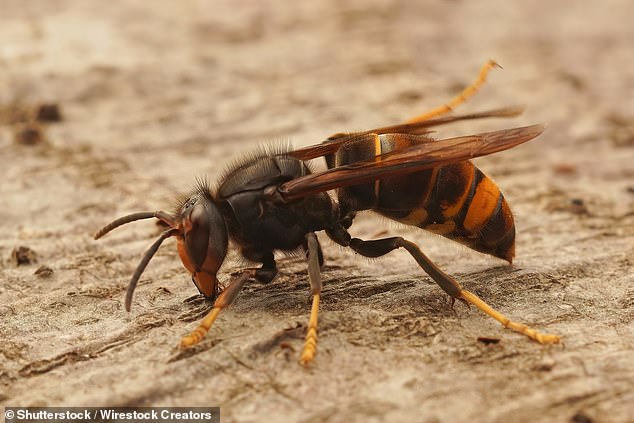
Seirian Sumner, UCL’s professor of behavioural ecology, told The I Paper that the early summer heat and dry spring conditions have indicated a ‘good wasp year’ for 2025. The high UK temperatures has increased insect populations that wasps then hunt as prey
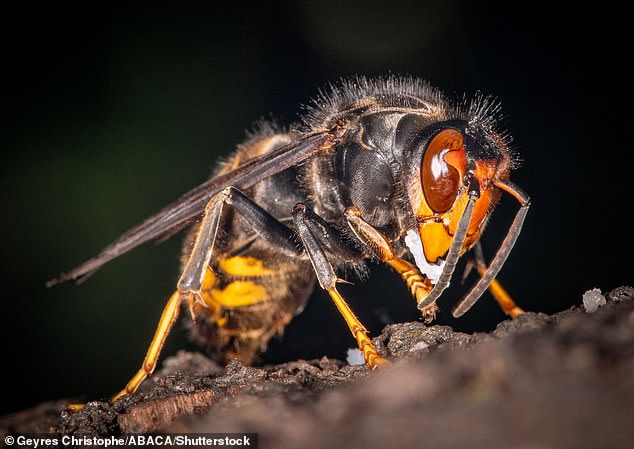
This year, Daniel Steward, managing director at Shield Pest Control, insists that his teams have received a ‘noticeable increase in wasp-related enquiries’ across the summer. He told The I Paper that the stark rise in temperatures had sped up the wasp breeding cycle
The result is that an unusually high number of adult-sized wasps buzzing around, with Mr Steward advising both homeowners and businesses to remain ‘vigilant’ as the numbers continue to soar.
And there is even more bad news for those fearful or fed up with the unwelcome insects – wasp numbers could reach an all time high as we head into August.
While for most of the year adult wasps hunt insects to fee the larvae – in exchange for a sugary substance released by the larvae as a reward, the late summer months of August and September bring less larvae, as they pupate in the warm summer months.
So adult wasps are forced to hunt out sugar of their own, which explains why the insects tend to fly straight towards sugary drinks and food.
In contrast, last year, wasps were hit by a wet spring and cold start to summer, with Adam Hart, professor of science communication at the University of Gloucestershire telling MailOnline that ‘all of the signs’ suggested it was a ‘very poor summer for wasps’.
Professor Hart added: ‘While that may sound like great news if you’re out on a picnic, wasps play a crucial role as pollinators and natural pest controllers, keeping on top of insects that feed on crops and garden plants.
Meanwhile, Professor Sumner added that due to competition for resources, if the wasp population levels tend to be high one year then they typically drop the next, indicating that 2025 is likely to be a strong wasp year.
The UK’s biggest annual monitoring scheme, the Big Wasp Survey, co-led by Professor Sumner, is set to undertake its next sampling phase between August 2 and August 10.
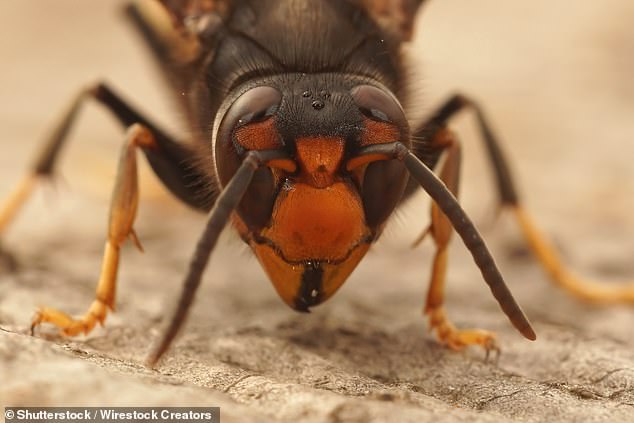
In contrast, last year, wasps were hit by a wet spring and cold start to summer, with Adam Hart, professor of science communication at the University of Gloucestershire telling MailOnline that ‘all of the signs’ suggested it was a ‘very poor summer for wasps’
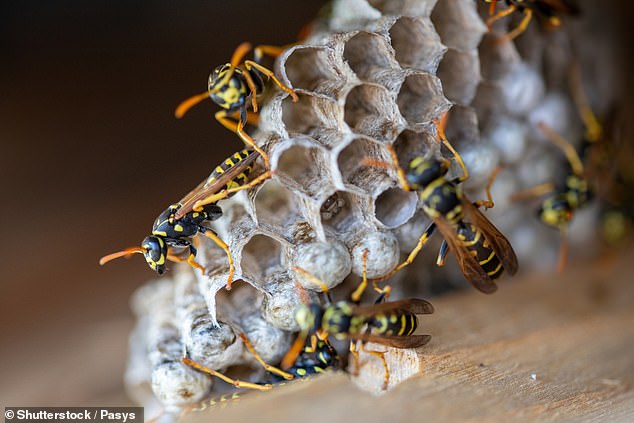
Despite the annoyance of nature’s unloved insects and the painful sting they can leave behind, Professor Sumner previously told MailOnline that we need to ‘actively overhaul the negative image of wasps to protect the ecological benefits they bring to our planet’
Designed to ‘help to quantify wasp species, abundance, diversity and distribution’, the results should eventually give a good indication of the changes and trends of the UK wasp population over a 60-year period.
Those wishing to take part in the survey need to create a simple trap using a plastic bottle and 200ml of lager, then log the number of wasps caught.
All wasps bar the queen die by the end of summer, so the traps shorten their lives by only a week or two.
Despite the annoyance of nature’s unloved insects and the painful sting they can leave behind, Professor Sumner previously told MailOnline that we need to ‘actively overhaul the negative image of wasps to protect the ecological benefits they bring to our planet’.
Adding that the species are facing a similar decline to bees, he said that wasps are essential due to their role in pollinating our flowers and crops, alongside destroying pests and insects that carry human diseases.
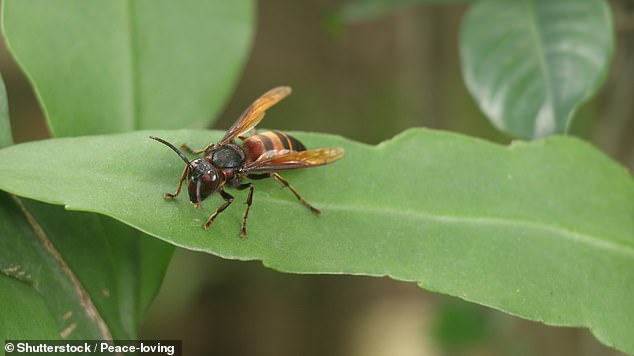
For those fed up with the incessant number of wasps plaguing their home this summer, there are several humane insect repellents that can help keep the buzzing intruders out
But for those fed up with the incessant number of wasps plaguing their home this summer, there are several humane insect repellents that can help keep the buzzing intruders out.
Fresh lemons and cloves, pungent scents that are said to be repulsive to flies, or even oranges, can be used to help deter wasps.
Simply halve two lemons and stick a handful of cloves into the cut flesh. Then, balance each half inside an egg cup and place on windowsills and kitchen counters, inside doorways and beside rubbish bins. They’ll last up to a week.
Handheld insect catcher devices, available to purcahse online, can help to catch the wasps, although insect-phobes fearful of the creepy-crawlies may be less inclined to get so close.
As wasps eagerly circle your food as you attempt to enjoy a meal sat outside in the scorching sun, fly-proof fans can also help to confuse wasps and also stimulate a threat.












